Written by Karel Minor, Humane Pennsylvania President & CEO
 A drowning man may be forgiven for not reflecting on the size of the body of water in which he’s drowning. After all, drowning in the ocean, a lake, or a bathtub is still drowning. The volume of the body of water is irrelevant when you’re inhaling it and trying your best to survive.
A drowning man may be forgiven for not reflecting on the size of the body of water in which he’s drowning. After all, drowning in the ocean, a lake, or a bathtub is still drowning. The volume of the body of water is irrelevant when you’re inhaling it and trying your best to survive.
But let’s say this proverbial man is in a bathtub and that bathtub has been draining steadily, yet he’s still crying out that he’s drowning. Suppose we say to him, “Hey, buddy, there’s only four inches of water in that tub. Try lifting your head up,” and he responds, “Last year there was two inches, so there’s twice as much water now, and it only takes an inch of water to drown!” Would we be wrong to wonder why he insists on drowning, splits statistical hairs, and engages in pedantry over methods and means of drowning, rather than acknowledging that he’s very definitely flailing in a puddle, not in an ocean?
I think this is an apt metaphor for what has happened this year in animal sheltering. You’ve probably seen the headlines screaming that shelters are overrun and facing massive percentage increases in intake. Many of these headlines resulted from press releases of shelter data that showed double-digit percentage increases in shelter intake and euthanasia (note that “percentage” was twice emphasized). According to the news, and many, many voices in animal welfare, shelters are drowning in an ocean of animals and that ocean has become profoundly deeper- just look at that double-digit statistical increase over three years ago!
I’m here to tell you that those statistics are true. But the narrative they imply is a lie.
Someone clever once said there are three kinds of lies: Lies, damned lies, and statistics. And the heavy use of statistics over numbers, and in a vacuum of context, is often a good indicator of which kind of lie it is. In May 2007, I posted a blog under that title announcing that HPA (then Berks Humane) would be the first sheltering organization in Pennsylvania to post its raw shelter intake and outcome data. I made the case that animal shelters were then using statistics to make their circumstances and outcomes seem better than they were.
Today the opposite appears to be the case. The broader sheltering community is using carefully selected statistics with carefully chosen time spans to make things appear worse for shelters than they are. These statistics are often taken from the Shelter Animals Count reporting, the largest publicly available aggregation of intake and outcome data. They reported that in the first half of 2024, “live outcomes” outcomes for approximately 3.8 million cats and dogs entering shelters was 91% for cats and 90% for dogs.
Sorry, did I bury the lede? Allow me to scream that like it should be screamed, “Fewer than 10% of shelter cats and dogs died in shelters making America a No-Kill nation!” Why isn’t that the headline? If this had happened ten years ago, or in 2007 when I warned of squishy statistics hiding bad news, I feel like we’d have had an explosion of positive press. Instead, we get told of all the ways animals are worse off.
Here’s the deal: All of these statistics are compared against the aberrant intake numbers that occurred during COVID when shelters essentially closed their doors to the public (and, no, it was NOT a huge number of adoptions that led to empty kennels covered by the press, it was caused by locked doors). That precipitous 2020 decline took a couple of years to rebound back up by 2023. But 2023 was lower than the numbers pre-COVID. In fact, the number of animals entering shelters and dying in shelters has been on the decline for the past 50 years, from shelter deaths of 15 million or higher to only 850,000 in 2023. If that’s the case, why can anyone be claiming double-digit increases, and what do I mean by “only” 850,000? That seems like a lot of dead animals.
That’s one of the problems with success and one of the problems with the arbitrary 90% save rate defining no-kill status promoted so heavily by some national groups. First, if we want to know if 90% is no-kill, don’t ask the 9 out of 10 animals that lived, ask the one that died in a shelter. I bet that one feels like it wasn’t a no-kill shelter. The definition of “No-Kill” has always come with troublesome baggage. How do we define killing and what’s real euthanasia? When we were drowning in an ocean of dead shelter animals, we could be forgiven if we didn’t quibble over percentages while we tried to tread water. But now we are in a bathtub arguing over what counts as drowning and still clinging to the old press terror tactics our industry has relied on for decades.
Second, numeric success can fuel statistical failure. Saving 90% of a million animals might be considered no-kill, despite 100,000 dead animals. But what happens when the number drops really low? What if only two animals enter a shelter and one is euthanized? That’s a 50% euthanasia rate. It’s also 99,999 fewer than the one that achieved 90%. I know what community I’d rather live in.
We see these games played with crime statistics on the news. We have historically low crime so any blip of a low number yields large percentage increases or decreases. But numerically it’s not relevant. The whole, good, picture is lost in the statistical trickery. Is that a lie? It might depend on intent, it might be due to ignorance, or it might be lazy journalism. You decide.
To be clear, some parts of the country are much worse off than others. And if you are a euthanized animal or the victim of a crime, your rate of death and crime are 100%, and big pictures or long-term trends are cold comfort.
No-kill advocates used to berate “open-admission” shelters for their high intake and euthanasia rates and compare them against their artificially low managed intake numbers and low euthanasia rates that came courtesy of screening out problematic animals. Now “open-admission” shelters are using statistical variation to berate no-kill shelters for not doing enough to help them handle their tsunami of incoming animals. Both play games with semantics, definitions, and statistics and neither narrative has ever been truly and fundamentally honest. No-Kill shelters have always employed some measure of intake management. And open-admission shelters have never taken in every single animal presented to them. Do “Sorry, no ID, not our municipality, it bit within the last ten days, we can’t reach the owner, etc.” ring a bell?
I believe both sides of this argument suffer from the same problem of lack of imagination and inability to see the forest for the trees. An arbitrary 10% death rate is assuredly not no-kill. But a few percent up and down variation off a historically low number is not drowning in animals and certainly not a return to 1970/80/90/2000 numbers. Instead of agreeing that we have made amazing progress as an industry and a nation, but we still have work to do, we keep fighting the same battles, using the same tired and outdated arguments. Only now it is “open-door” shelters using statistics to make things look worse than they are and no-kill shelters under fire for Pollyanna claims of success while standing on a pile of dead animals.
We should not accept that any level of death in shelters is OK, even if most people can agree that some may be unavoidable or even appropriate. Sometimes euthanasia is the right choice to prevent suffering but it’s certainly not successful. We also shouldn’t pretend that every shelter death is unavoidable or appropriate. Some shelters are just bad at their jobs. Now no-kill shelters are trapped by a definition of success that doesn’t ring true to the real world. Open-door shelters are trapped in an existential crisis. What do all these shelters do when there are 90% fewer animals entering shelters than 50 years ago?
Humane PA saw this March of Dimes moment- when the problem you combat is solved- coming nearly two decades ago and we started to expand what we did to include a myriad of ways to help animals and people other than just being the dump for community animals. We have a small fraction of the intake and shelter death we did twenty years ago, but it’s still not zero. Others can and have found new directions and approaches of their own. Many still cling desperately to rigid, old models, and will survive for a while. Some organizations may, and probably should, dissolve.
Metaphors are useful because they allow a person to “get” your point via a example that is more universally understood or experienced without having to engage in extensive exposition and explanation. If I may be forgiven beating this drowning metaphor to death, if shelters were people and they were drowning, what might they do? If someone was swimming with other people they might call for- and accept- help. If someone found herself in a rip current, she might change her approach, stop trying to swim back to shore, and instead swim across the current until the rip current subsided and her old swim strokes were once again effective. Sometimes one might find himself not swimming, but being carried away in deadly floodwaters. But floods are rare and they are transient. We should never claim every swim is in a flood, any more than we should mistake a bathtub for an ocean. And finally in this tortured metaphor, if people can’t swim, maybe they should stay out of the water.
Unlike English poet Stevie Smith’s “larking chap”, most shelters aren’t drowning, they’re waving.




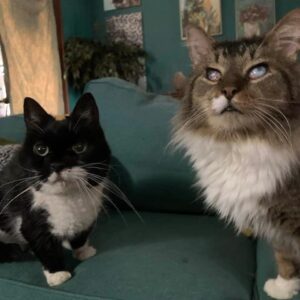 infection among other things. After her vet check, it was recommended to adopt her out as hospice care. I decided to adopt her knowing I might not have her for long. Sadly, she passed away four months later, but I made sure she spent the last few months of her life happy and loved.
infection among other things. After her vet check, it was recommended to adopt her out as hospice care. I decided to adopt her knowing I might not have her for long. Sadly, she passed away four months later, but I made sure she spent the last few months of her life happy and loved. One September morning a cat was abandoned at the shelter. We scanned the cat and found out she was adopted from our organization 15 years ago. She was frail and extremely underweight. Her name was Rapunzel but I called her Princess Thumbs because she was a polydactyl cat. After getting her blood work done it turned out that she had hyperthyroidism and needed to be on medication and a special diet. After doing some research about the disease, I adopted her. I was not sure of the outcome since she was so thin and I had no idea how long she was in this condition but I was determined to try. Unfortunately, her illness was too far gone, but she did give me two wonderful weeks. She was truly an amazing cat. I miss you, my crunchy princess.
One September morning a cat was abandoned at the shelter. We scanned the cat and found out she was adopted from our organization 15 years ago. She was frail and extremely underweight. Her name was Rapunzel but I called her Princess Thumbs because she was a polydactyl cat. After getting her blood work done it turned out that she had hyperthyroidism and needed to be on medication and a special diet. After doing some research about the disease, I adopted her. I was not sure of the outcome since she was so thin and I had no idea how long she was in this condition but I was determined to try. Unfortunately, her illness was too far gone, but she did give me two wonderful weeks. She was truly an amazing cat. I miss you, my crunchy princess. surrendered for meowing too much. Her name was Marigold. She was super sweet and did indeed “talk” a lot, which made me love her even more. After getting blood work done for her, results showed that she had hyperthyroidism. I was a little nervous because I was worried I would lose her too. I still decided to adopt her and give her a chance. Well, she is now a happy cat that “talks too much” if her bowl is empty. She will hop after you like a rabbit making sure you hear her loud and clear.
surrendered for meowing too much. Her name was Marigold. She was super sweet and did indeed “talk” a lot, which made me love her even more. After getting blood work done for her, results showed that she had hyperthyroidism. I was a little nervous because I was worried I would lose her too. I still decided to adopt her and give her a chance. Well, she is now a happy cat that “talks too much” if her bowl is empty. She will hop after you like a rabbit making sure you hear her loud and clear. During our annual 12 Days of Adoptions event during the holidays, the majority of the cats at the shelter were finding homes. There was one cat I was hoping would find her furever home since she had been overlooked for 8 months. Her name was Karma, an adorable Orange and white cat with the cutest “RBF” squishy face. Karma had a few medical issues. She was FIV+, had an old ankle injury that made her limp, and experienced bladder issues which would require a special diet and medication for life. When Christmas Eve and the last day of the adoption special arrived, I told Karma “It’s time to go home”. It’s been two months since she came home and I’m so happy I made that decision. Her health has since improved and she couldn’t be happier in her new home.
During our annual 12 Days of Adoptions event during the holidays, the majority of the cats at the shelter were finding homes. There was one cat I was hoping would find her furever home since she had been overlooked for 8 months. Her name was Karma, an adorable Orange and white cat with the cutest “RBF” squishy face. Karma had a few medical issues. She was FIV+, had an old ankle injury that made her limp, and experienced bladder issues which would require a special diet and medication for life. When Christmas Eve and the last day of the adoption special arrived, I told Karma “It’s time to go home”. It’s been two months since she came home and I’m so happy I made that decision. Her health has since improved and she couldn’t be happier in her new home.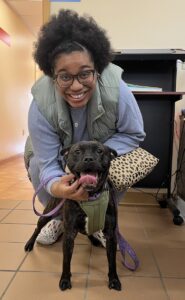
 Volunteer Your Time
Volunteer Your Time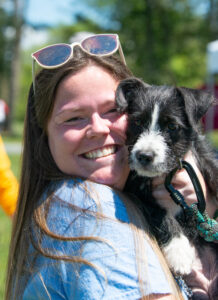
 Humane PA is very excited to share details about our next steps to deliver the most impactful services to animals and people in our community! The needs of animals and the community have rapidly changed a great deal in recent years. In the last 20 years, the number of animals entering Humane PA shelters has declined by over 85%. Shelter euthanasia has declined by 99%. These numbers reflect national statistics.
Humane PA is very excited to share details about our next steps to deliver the most impactful services to animals and people in our community! The needs of animals and the community have rapidly changed a great deal in recent years. In the last 20 years, the number of animals entering Humane PA shelters has declined by over 85%. Shelter euthanasia has declined by 99%. These numbers reflect national statistics.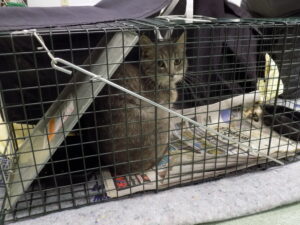 stemming from house pets, the limited and scattershot approaches for feral and free-roaming cats have not been as successful. That’s because sterilizing a few cats from this colony and a few from that colony leaves plenty of cats behind to breed. Humane PA is now taking a different approach, based on data and models with proven success. Since February, under the leadership of free-roaming cat whisperer, Alex Young, our Healthy Pets Initiative staff have been working directly with caretakers of colonies ranging from a half dozen to a hundred cats. One colony at a time, we have been sterilizing 100% (or as close as possible) of partner-managed colonies. By sterilizing every single cat in an extremely short time frame, we ensure there are no new litters, avoid boom and death cycles, and make it possible to effectively intervene when one or two new cats move into a colony.
stemming from house pets, the limited and scattershot approaches for feral and free-roaming cats have not been as successful. That’s because sterilizing a few cats from this colony and a few from that colony leaves plenty of cats behind to breed. Humane PA is now taking a different approach, based on data and models with proven success. Since February, under the leadership of free-roaming cat whisperer, Alex Young, our Healthy Pets Initiative staff have been working directly with caretakers of colonies ranging from a half dozen to a hundred cats. One colony at a time, we have been sterilizing 100% (or as close as possible) of partner-managed colonies. By sterilizing every single cat in an extremely short time frame, we ensure there are no new litters, avoid boom and death cycles, and make it possible to effectively intervene when one or two new cats move into a colony.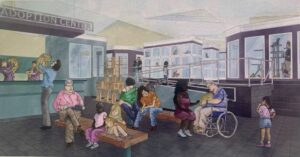
 We heard this loud and clear in a recent survey of our supporters. Over 90% of respondents said they thought there needed to be more affordable options. Over 60% of respondents told us that they had faced barriers of some type that prevented them from accessing, including cost or the health or behavioral challenges of their pets. Humane PA knows that some of these pets might end up in shelters if owners can no longer access routine boarding services. Humane PA also knows that there are few or no boarding options regularly available for emergency response, domestic violence victims, those facing health crises, and police dogs.
We heard this loud and clear in a recent survey of our supporters. Over 90% of respondents said they thought there needed to be more affordable options. Over 60% of respondents told us that they had faced barriers of some type that prevented them from accessing, including cost or the health or behavioral challenges of their pets. Humane PA knows that some of these pets might end up in shelters if owners can no longer access routine boarding services. Humane PA also knows that there are few or no boarding options regularly available for emergency response, domestic violence victims, those facing health crises, and police dogs. services may feel very different or even alien to what is perceived as “animal sheltering”. Although we had the kernel of an idea over a decade ago, since then several organizations around the nation have pioneered boarding programs to address the new needs of their communities to great success. These services are needed and they make a difference, whether it’s the pet of an adopter or a police dog of an officer needing to travel, the cats of someone displaced by fire, the dog of someone who is admitted to the hospital with a heart attack, or the pets of those trying to flee domestic violence
services may feel very different or even alien to what is perceived as “animal sheltering”. Although we had the kernel of an idea over a decade ago, since then several organizations around the nation have pioneered boarding programs to address the new needs of their communities to great success. These services are needed and they make a difference, whether it’s the pet of an adopter or a police dog of an officer needing to travel, the cats of someone displaced by fire, the dog of someone who is admitted to the hospital with a heart attack, or the pets of those trying to flee domestic violence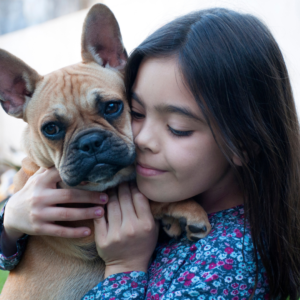 I don’t like to admit it, but as an independent rescuer for decades, I became judgmental of people who struggled to give basic care to their pets. When I met pet owners who did not match my level of pet care, it was easy for me to immediately deem them as uncaring and irresponsible without knowing any further details! However, when I started working professionally in animal welfare, I met people who had the same empathy for the animals, but with far less resources. They were rescuing outside kittens, helping injured strays or inheriting pets from friends/family that can no longer care for them and sometimes, they need a little help.
I don’t like to admit it, but as an independent rescuer for decades, I became judgmental of people who struggled to give basic care to their pets. When I met pet owners who did not match my level of pet care, it was easy for me to immediately deem them as uncaring and irresponsible without knowing any further details! However, when I started working professionally in animal welfare, I met people who had the same empathy for the animals, but with far less resources. They were rescuing outside kittens, helping injured strays or inheriting pets from friends/family that can no longer care for them and sometimes, they need a little help. 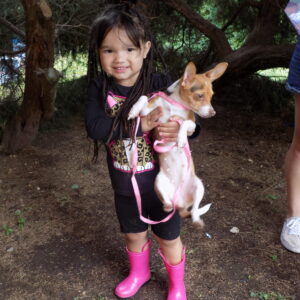 turn, leaves more space at the shelter for the animals that really need a safe place, vet care and possibly a new family (or are reunited!).
turn, leaves more space at the shelter for the animals that really need a safe place, vet care and possibly a new family (or are reunited!). 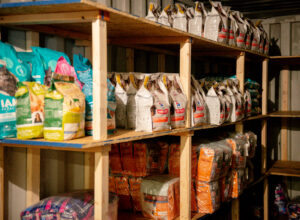 benefit from our organization’s enrollment in a food program that provides the same brand and type of food to everyone. Ongoing participation in this program results in a win-win situation:
benefit from our organization’s enrollment in a food program that provides the same brand and type of food to everyone. Ongoing participation in this program results in a win-win situation: Bubba Lou, a 6-year-old neutered male American Pit Bull Terrier, was surrendered to the
Bubba Lou, a 6-year-old neutered male American Pit Bull Terrier, was surrendered to the 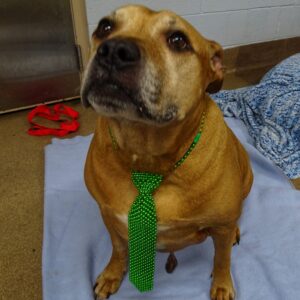
 Bubba Lou is one of the thousands of dogs, cats, and critters Humane Pennsylvania helps throughout the year. Please consider visiting the
Bubba Lou is one of the thousands of dogs, cats, and critters Humane Pennsylvania helps throughout the year. Please consider visiting the 
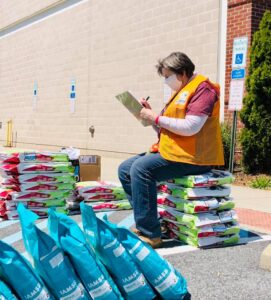
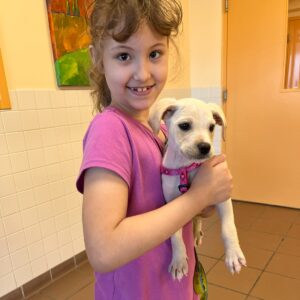
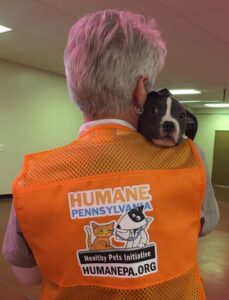
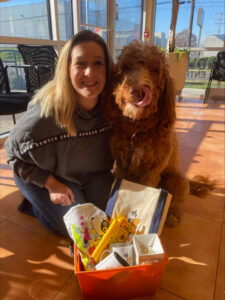 the first non-profit walk-in animal clinic in the region. The
the first non-profit walk-in animal clinic in the region. The 
 vaccinations. Guinea pigs can’t help us pay for our work. All those things require people. And without people, we’re nothing.
vaccinations. Guinea pigs can’t help us pay for our work. All those things require people. And without people, we’re nothing. “My best friend arrived at the Humane League of Lancaster in April 2017. He was a smelly, filthy, hot mess of a cat with a laundry list of medical issues and a heartbreaking past.
“My best friend arrived at the Humane League of Lancaster in April 2017. He was a smelly, filthy, hot mess of a cat with a laundry list of medical issues and a heartbreaking past. easily with the rest of my crew, it was like he had been with us forever.
easily with the rest of my crew, it was like he had been with us forever. During the day, Henry can often be found curled up in his igloo bed, cuddling with his best friend Chester, or chasing around things that make a crinkle noise. Henry’s newest BFF is our foster-to-adopt rabbit. He loves to spend time in her room, and she gets so delighted when he visits her!
During the day, Henry can often be found curled up in his igloo bed, cuddling with his best friend Chester, or chasing around things that make a crinkle noise. Henry’s newest BFF is our foster-to-adopt rabbit. He loves to spend time in her room, and she gets so delighted when he visits her!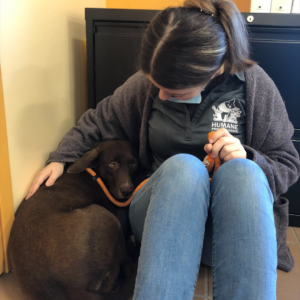 My plan was to spend all my extra time trying to make her comfortable with me and gain her trust. This started with us standing on opposite sides of the kennel — and lots of treats. She slowly became comfortable enough to eat them, but only if I was not looking directly at her.
My plan was to spend all my extra time trying to make her comfortable with me and gain her trust. This started with us standing on opposite sides of the kennel — and lots of treats. She slowly became comfortable enough to eat them, but only if I was not looking directly at her.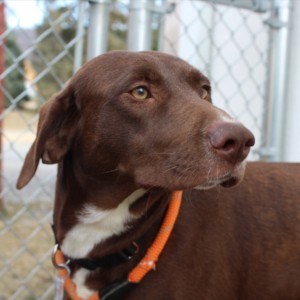 giving Gracie treats and calmly talking to her to coax her out of her shell, and she eventually gave in to their kind attempts.
giving Gracie treats and calmly talking to her to coax her out of her shell, and she eventually gave in to their kind attempts.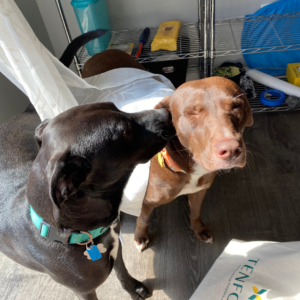 “When we got Gracie, she was incredibly shut down and would run away from us and hide any chance she got. She no longer hides and is often found roaming around, exploring the house while wagging her tail. Even more frequently, she can be found sitting on top of anyone who is willing to give her her favorite neck rubs. She has started giving us face kisses and smiles when she gets to run around outside. She’s such a good dog, and I’m so glad that you all believed in her and in us.” – Bryan and Alicia (Gracie’s adopters)
“When we got Gracie, she was incredibly shut down and would run away from us and hide any chance she got. She no longer hides and is often found roaming around, exploring the house while wagging her tail. Even more frequently, she can be found sitting on top of anyone who is willing to give her her favorite neck rubs. She has started giving us face kisses and smiles when she gets to run around outside. She’s such a good dog, and I’m so glad that you all believed in her and in us.” – Bryan and Alicia (Gracie’s adopters)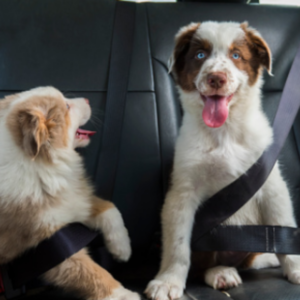 In our area of Pennsylvania, we don’t have to worry too much about natural disasters like hurricanes and tornadoes. However, severe weather here can easily lead to flooding. And no matter where you live, you can be affected by a local water main break or power outages due to high winds and ice storms.
In our area of Pennsylvania, we don’t have to worry too much about natural disasters like hurricanes and tornadoes. However, severe weather here can easily lead to flooding. And no matter where you live, you can be affected by a local water main break or power outages due to high winds and ice storms.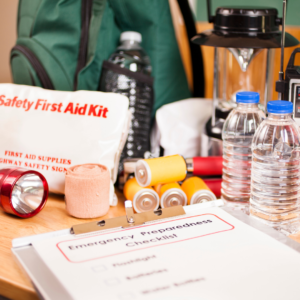 leashes, and/or harnesses, and a favorite toy/scent article. Pack a duplicate bag to keep in the car if you travel often with your pet, and be sure to rotate medications so they stay fresh.
leashes, and/or harnesses, and a favorite toy/scent article. Pack a duplicate bag to keep in the car if you travel often with your pet, and be sure to rotate medications so they stay fresh.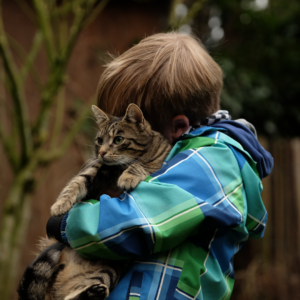 Humane Pennsylvania is home to the Berks County Animal Response Team (CART), which works directly with the Pennsylvania State Animal Response Team (PSART) and serves as the primary Eastern Pennsylvania large-scale emergency distribution resource for pet food and supplies. We are gearing up to deploy emergency supplies for up to 1,500 animals.
Humane Pennsylvania is home to the Berks County Animal Response Team (CART), which works directly with the Pennsylvania State Animal Response Team (PSART) and serves as the primary Eastern Pennsylvania large-scale emergency distribution resource for pet food and supplies. We are gearing up to deploy emergency supplies for up to 1,500 animals.